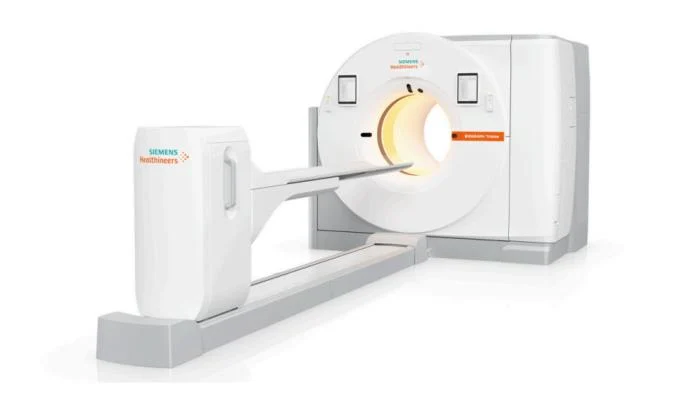What’s New in PET/CT
Early variation of 18-fluorine-labelled fluorodeoxyglucose PET-derived parameters after chemoradiotherapy as predictors of survival in locally advanced pancreatic carcinoma patients.
PET/CT Updates, Research & Education
November 2019
Purpose
To investigate if early variation of PET-derived parameters after concomitant chemoradiotherapy (CRT) predicts overall survival (OS), local relapse free survival (LRFS), distant relapse free survival (DRFS) and progression free survival (PFS) in locally advanced pancreatic cancer (LAPC) patients.
Methods
Fifty-two LAPC patients (median age: 61 years; range: 35-85) with available FDG PET/CT before and after RT (2-6 months, median: 2) were enrolled from May 2005 to June 2015. The predictive value of the percentage variation of mean/maximum standard uptake value (ΔSUVmean/max), metabolic tumour volume (ΔMTV) and total lesion glycolysis (ΔTLG), estimated considering different uptake thresholds (40-50-60%), was investigated between pre- and post-RT PET. The percentage difference between gastrointestinal cancer-associated antigen (ΔGICA) levels measured at the time of PET was also considered. Log-rank test and Cox regression analysis were performed to assess the prognostic value of considered PET-derived parameters on survival outcomes.
Results
The median follow-up was 13 months (range: 4-130). At univariate analysis, ΔTLG50 showed borderline significance in predicting OS (P = 0.05) and was the most significant parameter correlated to LRFS and PFS (P = 0.001). Median LRFS was 4 and 33 months if ΔTLG50
was below or above 35% respectively (P = 0.0003); similarly, median PFS was 3 vs 6 months (P = 0.0009). No significant correlation was found between PET-derived parameters and DRFS, while the ΔGICA was the only borderline significant prognostic value for this endpoint (P = 0.05).
Conclusion
PET-derived parameters predict survival in LAPC patients; in particular, ΔTLG50 is the strongest predictor. The combination of these biochemical and imaging biomarkers is promising in identifying patients at higher risk of earlier relapse.
Source: Nucl Med Commun. 2019 Oct;40(10):1072-1080. doi: 10.1097/MNM.0000000000001065.
< https://www.ncbi.nlm.nih.gov/pubmed/31365502 > Retrieved 11 November 2019.

November Pancreatic Cancer Awareness
- The American Cancer Society estimates this year approximately 56,770 adults (29,940 men and 26,830 women) in the United States will be diagnosed with pancreatic cancer
- Pancreatic cancer accounts for about 3% of all cancers in the US, and it is the ninth most common cancer in women and the tenth most common cancer in men
Connect with Us
Get additional information and stay up-to-date with the latest news by connecting with us on social media.



